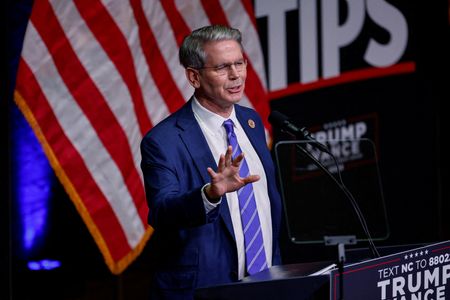What Scott Bessent’s Treasury nomination could mean for the economy, tariffs

Investing.com — President-elect Donald Trump announced on Friday that he will nominate Scott Bessent, a prominent investor, as the next US Treasury secretary.
The decision concludes a week of speculation and competition among high-profile candidates vying for the influential role, which oversees economic policy, regulation, and international financial relations.
Wall Street had been closely monitoring Trump’s pick, given his stated intentions to reshape global trade through tariffs and potentially expand the tax cuts implemented during his first term.
The selection of Bessent, a 62-year-old veteran of the finance world, signals a move likely to resonate positively with markets. Analysts suggest his experience and market expertise may help temper fears of aggressive tariff policies.
“Scott is widely respected as one of the World’s foremost International Investors and Geopolitical and Economic Strategists,” Trump said in a statement on Truth Social.
“[He] has long been a strong advocate of the America First Agenda,” Trump continued, noting that Bessent would “support my Policies that will drive US Competitiveness, and stop unfair Trade imbalances.”
Bessent, a known advocate for extending Trump’s initial tax cuts, is expected to champion similar measures in the administration. He has also defended the use of tariffs, which were a cornerstone of Trump’s campaign platform, describing them as a “useful negotiating tool.”
But while he supports the use of tariffs, Deutsche Bank (ETR:DBKGn) strategists do not believe that Bessent is “a trade hardliner.”
“He has generally argued in support of tariffs as a negotiating device and supported a gradualist approach with substantial forward guidance, even going as far as proposing implementing the 50- 60% tariffs on China by increasing 2.5 percentage points per month,” strategists noted.
“Bessent’s presence should therefore act as a counterbalance to Trump’s most extreme impulses on tariffs,” they said, adding that his appointment “supports a baseline of a somewhat more strategic or gradualist approach to trade wars.”
Separately, UBS strategists said the initial market reaction to Bessent’s appointment suggests that he is “seen by financial market participants as an anchor of stability and responsibility in the Trump cabinet.”
“In fact, we think markets could start to see that the risks of higher inflation and interest rates are implicit constraints on the Trump policy agenda, with the eventual policy outcomes potentially less inflationary than some investors previously feared.”
“While we do not rule out further volatility, we expect US Treasury yields to fall in the year ahead following the 65-basis-point rise over the past two months,” they added.







